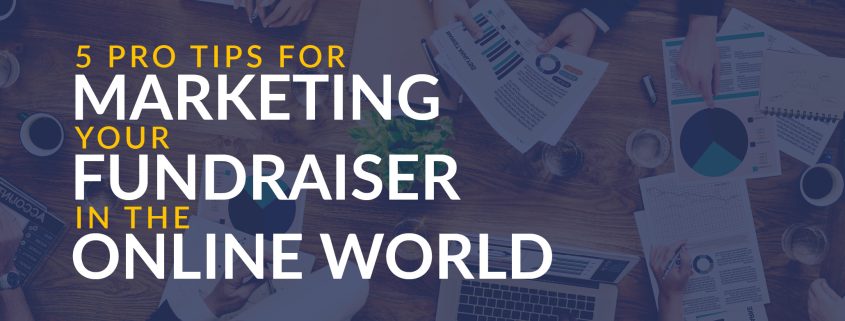5 Pro Tips for Marketing Your Fundraiser in the Online World
Let’s face it—if you’re not using online channels to market your fundraiser, you’re missing out on more donors, more dollars, and more support for your mission. Whether you’re hosting a golf tournament fundraiser, a gala, or even a bake sale, these tips will help you level up your online marketing.
1. Use a marketing-savvy software solution.
Get your tech in place before you do anything else online. A software solution for your fundraiser is a key part of spreading the word and attracting participants and donors. According to GolfStatus, your event’s management platform should be able to:
- Generate attractive, professional event websites
- Manage online registration
- Securely process donations and other payments
- Help promote your events with marketing automation
- Create and sell custom sponsorship packages
- Offer a mobile app for event participants with push notifications
- Effortlessly transfer fundraising data into your CRM
- Be backed by a responsive support team
2. Track your campaign’s progress with online marketing metrics.
Bottom line, you need to know what’s working and what’s not in marketing your fundraising event. By creating a marketing plan that outlines key metrics, you can better understand the success of your different campaigns. The following metrics can provide useful insights:
- Conversion rate. This is the percentage of viewers, website visitors, email recipients, etc. who complete a desired action, such as making a donation, signing up to become a volunteer, or registering for your fundraising event.
- Social media following. Understand your social media campaign’s success by tracking likes, followers, comments, clicks, and shares on each respective channel.
- Click-through rate. This is the percentage of recipients who actually click on the link, button, or other calls to action in your marketing materials.
- Email open rate. This figure tells you the number of email recipients who opened the message. This metric is helpful for understanding if your subject lines are clickable enough to hook recipients into opening the email.
3. Be strategic about your social media presence.
While it might be tempting to create accounts or profiles on every social media platform out there and blast information about your fundraising event, it’s not the best idea. Not only will you spread yourself too thin, particularly if you don’t have a dedicated social media manager to post regularly and monitor each channel, but you’re likely to get less engagement. Instead, focus on building a robust social media presence on just a few platforms where your target audience is present.
Here are a few guidelines from Double the Donation for choosing which social media platforms to focus on and leverage to promote fundraising events:
- Poll your supporters. Send out a survey to your donors, volunteers, and other supporters and ask them which platform(s) they use regularly.
- Focus on the platform that aligns with your content strategy. Does your organization have a library of video at its disposal (or plan to create marketing videos)? Will you rely more on photos and written testimonials? Different social media platforms have different content focuses. For example, Instagram is best-suited for photos and videos, while Twitter is better for short text snippets.
- Research your audience demographics. Factors such as age, hobbies, and location all contribute to what social media they consume and on what platforms, and are useful for targeting invitations to fundraising events. Gather demographic information to help choose which platform and content works for your nonprofit’s supporters.
4. Work with celebrities and influencers.
Online channels have made it easier to connect with celebrities and influencers. It may feel like a long shot, but nonprofits have a number of options to partner with those in the public sphere to amplify your cause and any fundraising events benefiting it. Keep the following in mind:
- Local celebrities can have a big impact. This could be the mayor, local news anchor or meteorologist, radio personality or host, community sports team, or well-known business owner. This can add a draw to your fundraiser without the hassle or expenses involved with a major celebrity.
- Focus on influencers related to your cause, community, or the type of event. Holding a singing competition or talent show? Consider reaching out to a performer who grew up in the area to be a guest judge. Throwing a golf tournament? Bring a long-drive professional to provide on-course entertainment (and raise extra money). Athletes, performers, businesspeople, and even well-known nonprofit professionals make great celebrity guests, especially if they have a connection to your cause.
- Pitch a sponsorship opportunity. If an influencer isn’t able to be at your event but still wants to get involved, make it simple for them by offering a sponsorship opportunity for their brand. Their brand benefits from the power of cause marketing and your organization gets exposure for your event and mission.
Getting Started with Software
Your organization stands to benefit from an increasingly online world. Online marketing not only spreads awareness about your work, but garners support for fundraising events and your mission in general. You can maximize your online presence by getting a software solution in place for your fundraising event. Whether you need a ticketing option for a charity golf tournament or online bidding software for auctions, a web-based software will save you time, make it easy to collaborate with your team, and help raise even more money for your organization.



